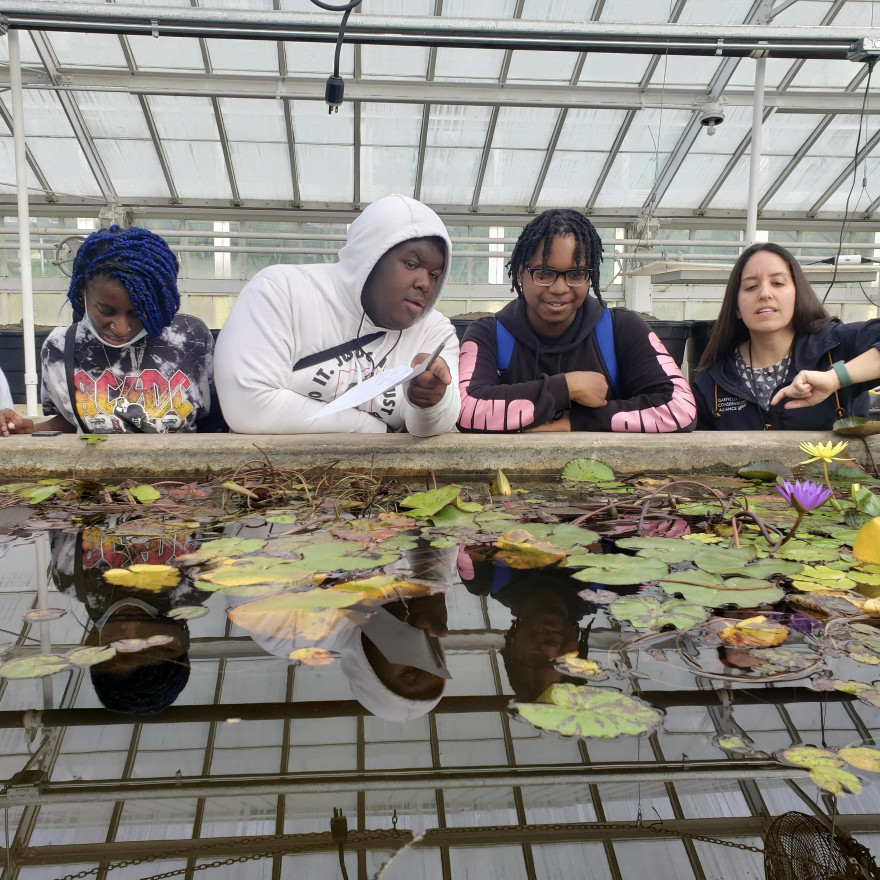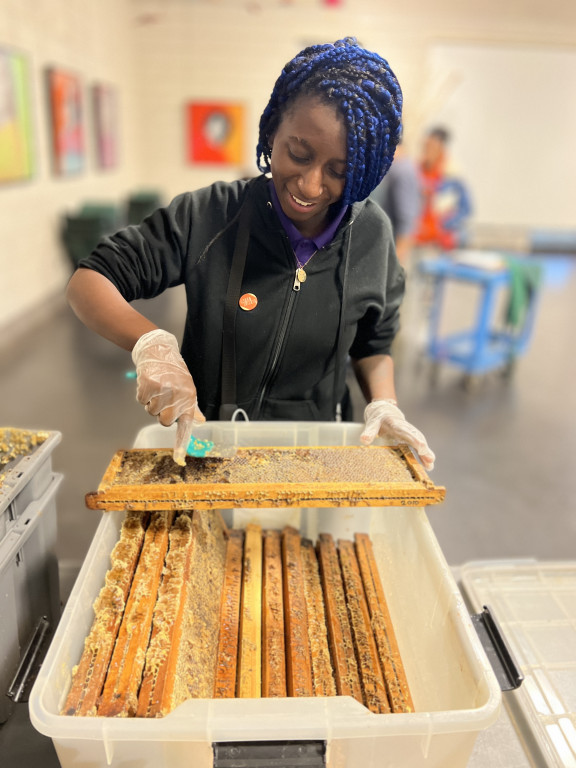
Urban Roots participants on a behind the scenes tour of the conservatory. (Garfield Park Conservatory Alliance)

Urban Roots participants on a behind the scenes tour of the conservatory. (Garfield Park Conservatory Alliance)
Chicago winters rarely leave a live plant in sight. But travel just six miles west of the city’s center to find the green oasis that is Garfield Park Conservatory. The conservatory puts on numerous events and programming to engage Chicago community members, but Urban Roots stands out for taking important strides in green education.
Urban Roots Teen Environmental Justice Program is a seasonal employment opportunity offered at Garfield Park Conservatory in Chicago to students from Al Raby High School. Participants can learn to be conservatory docents, receive mentorship, and build a better relationship with nature through the program.
Max Meyers, Youth Program Coordinator, said that staff are in the process of finalizing participants for the Spring session. But in order to make the program as accessible as possible, they try not to turn students away.
“The number one thing we’re looking for is engagement. Like being able to show up physically, emotionally and mentally in that space,” Meyers said.
When the program was started in 2016, students would give tours during their breaks in school. In 2022, the program shifted to being offered on a semesterly basis and as an after-school program. Marqueketa Glenn, Director of Youth Education at the conservatory, was hired in March 2022 with the intention of taking the project in a new direction.
“When I came into this role, I was just thinking how we could make this program less like school, and more geared around the youth’s interests and what they want to learn,” she said. “We still do docent training, but we’ve added the environmental justice component and the mentorship component that we’re still working on, but we’re trying to launch new things,” Glenn said.
Students learn how to plan and lead tours, maintain their own gardens, identify plants in the conservatory, as well as take field trips to different nature spaces and become engaged with local environmental justice issues. Glenn said that the program also collaborates with organizations such as Seed Your Future, which works to promote interest in green careers.

“As far as green jobs and green education, I think they’re really important, especially right now. When in high school, [students] talk about all the jobs that [they] can have, and it’s usually the same types of jobs every time. ‘I want to be a doctor, I want to be a lawyer, I want to be a teacher.’ We want to give more awareness about what other jobs are out there,” said Glenn.
Covid, however, affected some participation in the program, and Glenn and Meyers said that they are still in the process of trying to rebuild. But the program is the most “in-person” that it has been since the beginning of the pandemic.
“It was a pretty established program. And then Covid came and it was totally restructured for remote learning,” said Meyers. “Since then it’s gone through a number of iterations trying to adapt to the pandemic.”
The first iteration of the program did, however, keep some alumni around, such as A’Shanti Johnson, who now works as a program assistant for Urban Roots after being a participant in 2017. Johnson was hired directly from the program as a front desk associate. She later took on the role as program assistant in June of last year.
She said that before being in the program, she had never been to the conservatory. Nor had she conserider her potential role in tending to plants.
“I don’t have a green thumb. If I were to have a plant and try to take care of it, it probably would pass away. But when I grew my garden, I loved it,” Johnson said.
Now she said that she knows plenty about how plants grow and adapt. As the program assistant she helps to facilitate lesson plans and to coordinate students’ needs. And being with the conservatory for over five years now, she’s able to offer important conservatory expertise to Glenn and Meyers.
“She has more knowledge about the program than either of us because she was in it and she was here longer. She’s been very helpful in structuring the docent training with the young people,” said Glenn.
Since Johnson is closer in age with Urban Roots students, she said that she sometimes acts as a bridge between Meyers and participants. But Johnson still feels the difference between her generation and the younger one, saying that students now tend to be a lot more bold in talking about environmental issues than previous cohorts.
“We knew what was happening in the world. But when we got to the conservatory, it was a safe space where we really didn’t have to focus much on it or actually deal with it,” said Johnson. “Now it’s still a safe space, but students speak more openly about their pain, and how they feel in that safe space.”
While the program encourages students to pursue green careers, it isn’t the most important program outcome.
“You don’t have to commit to going into the green industry [to be in the program]. It’s just about being an aware and responsible person on this earth and understanding your nature connection and why it’s important,” said Glenn.